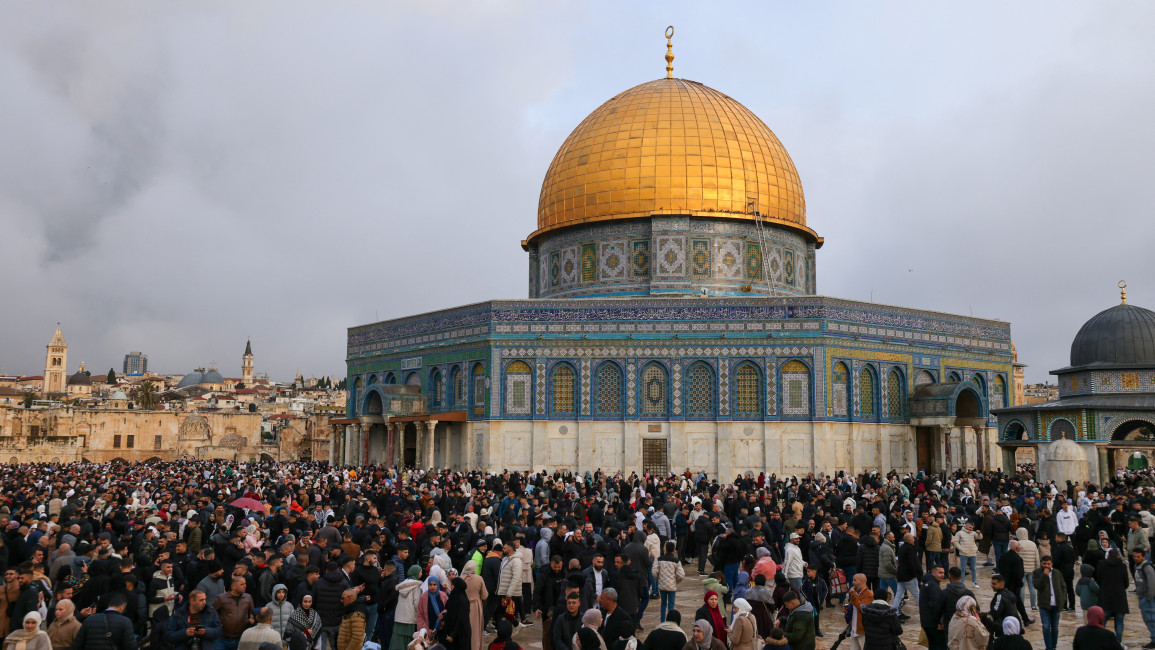Thousands of Palestinians perform Eid prayers at Al-Aqsa Mosque in Jerusalem
Thousands of Palestinian worshippers gathered for Eid prayers at Al Aqsa Mosque in occupied East Jerusalem on Wednesday morning, as Gaza faced ongoing attacks by Israeli forces.
More than 60,000 Muslims performed Eid al-Fitr prayers on Wednesday morning at the Al Aqsa compound in East Jerusalem, despite Israel placing restrictions on access for Palestinians.
Footage shared online by local media showed hundreds of people praying outside the mosque to mark the end of the holy month of Ramadan, a period of fasting and reflection for Muslims across the world.
Israeli authorities removed a number of people from Al-Aqsa leaving them to perform prayers in the streets nearby, Palestinian news agency WAFA reported.
Palestinian Authority President Mahmoud Abbas's Eid message called on people to mark the occasion with reduced celebrations considering the conflict in Gaza and the suffering of those in the West Bank, WAFA reported.
He hoped that an independent Palestinian state with East Jerusalem as its capital would be established by then with the return of refugees.
The atmosphere there was "more subdued than in previous years", with many people choosing not to have large celebrations in light of the ongoing war and destruction in Gaza, an Al Jazeera correspondent reported.
Palestinians in Gaza turned out to pray in the remnants of mosques which have been destroyed by Israeli attacks over the past six months. Local sources reported that Israeli drones were buzzing overhead in the southern city of Rafah, despite it being a day of celebration.
Eid prayer at Al Aqsa mosque in the occupied city of Jerusalem. pic.twitter.com/hqcHpce2EC
— Eye on Palestine (@EyeonPalestine) April 10, 2024
At Al-Aqsa, Israeli forces placed restrictions on those who can enter the mosque compound. Only men over the age of 60 and women over the age of 50 are allowed, as well as Palestinian citizens of Israel and residents of occupied East Jerusalem.
However, Israeli police still arbitrarily blocked those within these brackets from crossing into Jerusalem from the West Bank at checkpoints, and many Palestinians reported not being able to access Jerusalem on previous Friday prayers during Ramadan.
Hundreds of thousands of people have come to the Al-Aqsa Compound throughout Ramadan, despite ramped-up security patrols and regulations imposed by Israeli authorities.
Scenes of Eid prayer at Al Aqsa mosque in the occupied Palestinian capital city this morning. pic.twitter.com/cvmmDuXFRs
— Quds News Network (@QudsNen) April 10, 2024
The Al-Aqsa Compound, which constitutes the Al-Aqsa Mosque and the Dome of the Rock, is considered the third holiest site in Islam after Mecca and Medina.
Israeli forces, as well as settlers and extremists, regularly encroach into the compound, provoking tension and clashes with Palestinians.
The settlers perform provocative Jewish rituals while Israeli security forces throw tear gas and harass and detain worshippers.
Israel's far-right National Security Minister Itamar Ben-Gvir has advocated for tighter restrictions on Muslim prayer at Al-Aqsa while he has joined extremist Jewish groups in storming the compound in deliberate provocations.


![Minnesota Tim Walz is working to court Muslim voters. [Getty]](/sites/default/files/styles/image_684x385/public/2169747529.jpeg?h=a5f2f23a&itok=b63Wif2V)




![Debris near Rafic Hariri International Airport [Getty]](/sites/default/files/styles/image_330x185/public/2176162423.jpeg?h=a5f2f23a&itok=MCSK9mkM)
![An Israeli air strike on Jabalia killed teenage journalist Hassan Hamad [Screengrab/X]](/sites/default/files/styles/image_330x185/public/2024-10/hassan%20hamad1.jpg?h=c12e0b96&itok=Rd_dyCVp)
